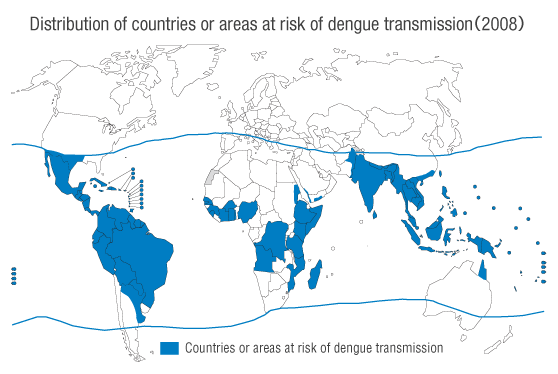Tropical region infectious diseases have now become a problem for all humanity because of rapid mobility
Tropical region infectious diseases such as malaria and trypanosomiasis have high mortality rates and are a constant threat in developing countries. Dengue fever infects an estimated 50 to 100 million each year. Of these 500,000 develop severe illness and about 12,500 die.

World Health Organization(WHO)
from "Working to overcome the global impact of neglected tropical diseases"
At the same time, these traditional diseases are having an impact, new and emerging infectious diseases are also spreading. Examples include SARS (severe acute respiratory syndrome) and avian influenza. Infections with avian influenza have been confirmed since November 2003 in Southeast Asia, the Middle East and Africa, and more than half of those infected have died.
Unlike malaria and AIDS, which are decreasing with the development of treatments, there are tropical infectious diseases that haven’t been studied enough. These are known as neglected tropical diseases (NTDs).

WHO has confirmed 620 Avian Influenza (H5N1) cases with 384 deaths as of February 15th, 2013.
WHO data is from the official homepage of Ministry of Health, Labour and Welfare.
NTDs and emerging infectious diseases are concentrated in the tropical regions, where about 80% of the world's population live. However, these diseases are not only a problem for developing countries, they are becoming a problem for developed countries as well. Economic globalization has accelerated the movement of people who then act as vectors in the rapid spread of these diseases across borders. Dengue fever which had been thought to be confined to the tropics appeared in France and Portugal in the 2000s.

People often use unsanitary lake water
for drinking and washing
(Lake Victoria, Western Kenya)
Measures against NTDs were one of the themes of the Toyako Summit in 2008, and NTD’s were established as an important international issue. We now realize that once a major outbreak occurs, it could lead to global economic stagnation, as a result of workforce disruption.
In order to stem the damage caused by infectious diseases, research and development for early detection and outbreak prevention is important. However, developing countries in tropical regions have insufficient economic bases to combat this problem. This lack of defense could lead to a rapid spread if an outbreak occurred. Cooperation between countries in case of outbreaks is essential to prevent the rapid spread of infections, because pathogens propagate regardless of borders.

Nagasaki University staff at our Kenyan research station
conducting Malaria research and
providing much needed drug support to the local populace.
The "Program for Nurturing Global Leaders in Tropical and Emerging Communicable Diseases" in Nagasaki University is designed to foster leaders and specialists equipped with the knowledge to combat the growing threat of emerging diseases as well as NTDs. In order to help prevent the spread of infectious diseases in developing countries, developed countries need to provide hi-tech, easy to use equipment, as well as implement an international risk management system to be used by all countries to monitor outbreaks.




